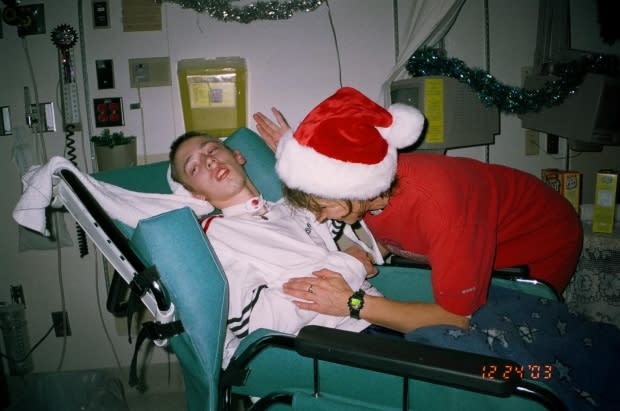Acts of extreme violence strip away ability to live normal life, say Sask. victims of crime
Sharlene Lange said it took just a few minutes for an act of violence to send her and her son's life into a tailspin.
Lange's son has largely been left to fend for himself 15 years after a brutal beating that left him permanently disabled, she said.
"My son was brutally brutally beaten, brain damaged like someone in a high speed car crash," Sharlene said of the 2003 beating of her son Kutler Lange.
During a home invasion in Saskatoon, Kutler was attacked with a whiskey bottle, knocked down and then his head was stomped upon which rendered him unconscious.
The beating stripped him of certain cognitive abilities, and left him barely able to walk at times during his rehabilitation. The man who assaulted Kutler was given a sentence of six years and 11 months back in 2005.
"How do you live with a deliberate act of such extreme violence, that took everything from you?" asked Sharlene, who has long advocated for changes to how victims of crime are compensated.

'Really hard to move on'
Kutler Lange received $25,000 in compensation from the province, but Lange said that money was a drop in the bucket for his rehabilitation needs. Instead, she poured her own money and savings into his rehab, and became his caregiver.
"I know people say, 'just move on, move on.' It's really hard to move on when you have physical and emotional impairments that are going to have barriers for you to even be able to look after yourself," said Lange.
Her son can not drive, can not look after himself to go on trips and now can only watch as his friends get married, have children and go on with their lives.
In 2014, the Government of Saskatchewan increased the compensation for anyone who suffered a long-term disability as a result of a violent crime. Now, people can receive up to a maximum of $100,000 for medical costs and lost earnings if they were not covered by any other programs, such as Social Services, Workers' Compensation, employment or health insurance.
According to the Ministry of Justice, in 2017-18, Victims Compensation payments totalled $1.2 million. In that same time frame, 903 new victim compensation applications were approved.
If you're working, and you think you have coverage through your job, check it out — because you probably don't. - Charlene Klyne, victim of crime
Lange said the increase in 2014 was an improvement, but was still imperfect. She noted for a young person like her son, who was not yet employed, or for a person living in poverty, the compensation for lost earnings would be virtually non-existent.
She said she would like to see victims of crime receive compensation similar to what people would receive if they were a victim of a vehicle crash.
"A victim of an impaired driver is exactly the same as my son," she said.
"One gets put on welfare, and the other lives on [Saskatchewan Government Insurance] and can live adequately."
Two life-changing minutes
Charlene Klyne was among the victims of the La Loche shooting in 2016, which left her without vision in her left eye and with shotgun pellets still embedded in her body.
"In the course of two minutes, he changed my life around totally," she said of the shooter, who has been sentenced to life in prison with no parole eligibility for 10 years.
In August, the Saskatchewan Ombudsman concluded Klyne was not entitled to more compensation from the Workers Compensation Board, and that the government and WCB had provided her the supports they were able to.

Klyne described the decision as a joke. She and her husband, who was also in the school at the time of the shooting, have struggled with the burden of medical and living expenses as well as a drastic loss in income.
"What do you want me to do? I did not plan this, it wasn't my fault," she said.
People may not realize the devastation of being a victim of crime, she said, urging people to consider their own insurance policies in the event they too could be a victim of crime.
"If you're working, and you think you have coverage through your job, check it out — because you probably don't."

